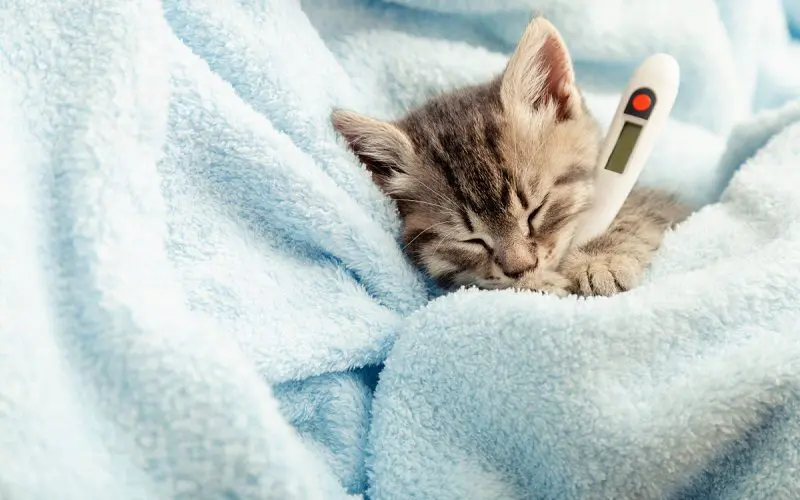Last Updated: 2 months ago
Wondering what medications you can give a cat for pain? The short answer is none.
Your vet, on the other hand, may prescribe one of many pain medications for cats or even human medications!
Pain medications are a big part of treating animals, be they cats, dogs, horses, or other livestock. Like human medicine, pain management is one of the big components of medical treatment for animals.
Even though cats are stoic creatures, rarely showing pain, they do experience it, and a good vet will always recommend pain management if your cat has been injured or is suffering from a problem that causes pain.
Let’s take a look at the pain medication for cats that could be prescribed for your kitty.
Common Pain Medication for Cats

Before we go any further, I want to make sure all cat owners have one thing at the forefront of their minds.
NEVER give any sort of medication—pain or otherwise—to your cat before consulting your vet. Only your vet will know what’s wrong with your cat and how to treat your furry friend.
In addition, some medications are toxic to cats, even though they’re perfectly fine for humans.
For example, acetaminophen, the NSAID most commonly known as Tylenol, can be fatal to felines.
It’s always a priority to contact your vet before administering any sort of medication. Now, without further ado, let’s get started.
1. NSAIDs
NSAID stands for non-steroidal anti-inflammatory drug. These are medications that reduce inflammation in the body and bring down fevers.
However, not all NSAIDs are safe. Your vet will tell you when an NSAID is called for and which one to use. The NSAIDs most commonly used by vets are:
- Robenacoxib is available in pill and injectable varieties.
- Meloxicam is most commonly used after surgery. Available in injectable and liquid form.
While these NSAIDs are considered relatively safe pain medications for cats, in some instances, they can cause damage to your cat’s kidneys, liver, heart, stomach, or intestines.
Symptoms to watch for include:
- Low energy
- Loss of appetite
- Changes in water intake and urination
- Vomiting
- Diarrhea or dark feces, which can indicate blood in the GI tract
- Yellow of the skin, eyes, or gums, which are signs of jaundice
2. Opioids

Opioids are another option in pain meds. These are most often prescribed after surgery or for painful conditions like chronic arthritis or advanced stage cancer.
Common opioids include:
- Codeine
- Fentanyl
- Hydromorphine
- Morphine
3. Corticosteroids
Corticosteroids, most commonly referred to as steroids, are often prescribed for pain due to the inflammation caused by arthritis, soft tissue swelling, and allergies.
These drugs are all about reducing inflammation. Common corticosteroids are:
- Dexamethasone
- Prednisolone
4. Gabapentin

One of the more targeted pain meds, gabapentin is a seizure medication that is also prescribed for pain in the nerves, muscle, and bone.
- Description: Gabapentin is an anticonvulsant and neuropathic pain medication used in cats to manage chronic pain conditions, such as arthritis, neuropathy, and post-surgical pain.
- How It Works: Gabapentin works by modulating nerve signals and reducing the perception of pain in the central nervous system.
- Administration: It is typically given orally in the form of capsules or liquid. The dosage varies depending on the cat’s size and the specific pain condition.
- Effectiveness: Gabapentin is often effective for chronic pain management and is well-tolerated by many cats.
5. Amitriptyline
This is a human anti-depressant but serves to treat nerve pain in cats.
- Description: Amitriptyline is a tricyclic antidepressant that can also be used in cats to manage chronic pain, particularly pain with a neuropathic component.
- How It Works: Amitriptyline alters the levels of certain neurotransmitters in the brain, which can reduce the perception of pain and discomfort.
- Administration: It is typically given orally as tablets or a compounded liquid. The dosage is carefully adjusted based on the cat’s weight and response to treatment.
- Effectiveness: Amitriptyline can be effective for managing certain types of chronic pain and can also help with behavior-related issues in cats.
6. Buprenorphine HCI

This is one of the safest of all pain meds. As an opiate partial antagonist, it doesn’t fit into any other category.
It comes in both injectable and oral forms and is a preferred pain management med due to its safety.
- Description: Buprenorphine is an opioid medication used in cats for pain relief, especially after surgery or for acute pain conditions.
- How It Works: Buprenorphine binds to opioid receptors in the central nervous system, providing strong pain relief.
- Administration: Buprenorphine can be administered in various forms, including oral transmucosal, sublingual, or injection. The dosage is determined by the severity of pain and the cat’s size.
- Effectiveness: Buprenorphine is highly effective for managing acute pain and can be used for both inpatient and outpatient pain control.
Always Call Your Vet for Advice on Pain Meds
If you cat seems to be in pain, do not try to treat her at home. Call your vet immediately.
You’ll need your vet’s expertise to figure out exactly what’s wrong with your cat and how to treat the problem. Only your vet can accurately assess your cat’s problem and decide what medications to give her.
That includes pain meds. You’ll notice that all the pain meds listed above are only things you can get through your vet.
That’s because vets should be the first and last word in what medications go into your cat’s body.
Even if you have some of these meds at home for yourself (almost all of them are also human meds), DO NOT attempt to treat your cat on your own.
The dosage for you is A LOT higher than it will be for your 8-pound kitty!
Has your vet prescribed any of the pain meds for your cat? Share your experiences below.
Resources:



I guess just like we do in humans we have to be careful what type of medication we give to cats and definitely not prescribe it ourselves. Consulting a vet is very important.
I had not clue that you can give cats NSAIDS. That is a new thing for me! I will have to share with my cat loving friend.
I do have a cat, so my knowledge in the medication department for cats is almost negligible, but this post is super helpful for anyone who pets a cat or knows someone who does. Thanks for sharing! 🙂
I am a dog lover but I have a colleague who has two cats and one has to take medication every day and she has told me many stories of her cat and changes he has made through medication.
I’ve had cats my whole life, but, thankfully, I haven’t had to acquire much knowledge about cat medication as my cats have been relatively healthy. That being said, my cats are getting older, and posts like this are invaluable to bookmark for the future, so thanks for putting this together!
I agree that it is definitely important to consult with a doctor before you give medication to your pets. Thank you for clarifying what the most common pain medications are when treating a cat.
I don’t own a cat but medications can definitely be important. As you said, it is definitely critical to consult a vet so the cat can be getting the right medication!
Wow never realised how many medicines there were available to cats. I had a pet dog that suffered from cancer and she had to take loads of meds towards the end. I think it’s amazing that pets have good options for healthcare now too.
My cat was just seen at the vet for chronic pain two months after getting declawed. He was prescribed meloxicam short term. The vet expressed that some cats need to be on pain medication for the rest of their lives. If that ends up being the case, I would like to try something natural. Im hoping that you can make some suggestions.